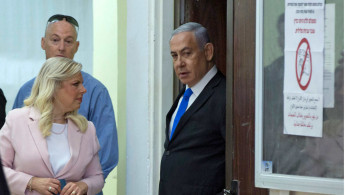Facebook reactivates Netanyahu chatbot after brief suspension for breaking election laws
Facebook reactivated a chatbot operated by Israeli Prime Minister Benjamin Netanyahu's official page on Tuesday after it was suspended for three hours for breaking election laws.
The social media site was asked by the Central Elections Committee head, Justice Hanan Melcer, to overturn the suspension of the automatic messaging function, AFP reported.
The chatbot was suspended for publishing opinion poll results - a breach of Israeli election law. It was initially set to be suspended until polls closed at 10pm GMT.
But Melcer instructed Facebook to reactivate the chatbot after Netanyahu removed the posts which violated election law.
Israeli election law does not allow the release of opinion polls three days prior to elections.
Netanyahu faces a formidable challenge as Israeli voters cast their ballots Tuesday in the second general election this year. The premier is seeking a fifth term, despite facing corruption charges.
The premier also broke Israeli election laws by giving a radio interview to Galey Yisrael radio station on election day.
Justice Melcer made clear last week that radio and television interviews with candidates is forbidden on election day.
Facebook had previously suspended the chatbot last week after it was found to violate hate speech policies.
The chatbot, part of the online election campaign for Netanyahu's Likud Party, greeted viewers with an automated message in Hebrew telling voters that "Arabs want to annihilate us all - women, children and men".
The message implored voters not to support the formation of a left-wing government that it said would include Palestinian-Israeli lawmakers.
It also boasted that Netanyahu would bring a "right-wing policy of a Jewish state, security, and a strong Israel".
Facebook said the chatbot had violated its "hate speech policy" and suspended it for 24 hours.
The head of the Palestinian Joint List party, Ayman Odeh, welcomed the move.
"Yesterday we went directly to Facebook and demanded that they stop giving a platform to Netanyahu's dangerous incitement and today we are seeing the results. We won against the camera project and we won the incitement too. There is an effect," he said, according to The Times of Israel.
Read more: The kingmakers in Israeli politics: The ultra-orthodox and the far-right parties
The Likud Party on Wednesday tried to distance Netanyahu from the content of the chatbot, calling it a "mistake by a campaign worker" which had not been approved by the prime minister.
Anti-Palestinian and hardline nationalist rhetoric has long dominated Israeli election campaigns in a bid to influence voters.
Earlier this week, Netanyahu issued a deeply controversial pledge to annex the Jordan Valley in the occupied West Bank if re-elected in 17 September polls.
He also attempted to introduce controversial legislation to allow party representatives to bring cameras to polling stations in a bid to intimidate Palestinian voters, but the bill was voted down.
Netanyahu famously warned on election day in 2015 that Palestinian-Israelis were "heading to the polling stations in droves", in an attempt to energise his right-wing base.
Netanyahu along with his right-wing and religious allies won a majority of seats in April polls, but he failed to form a coalition and opted for an unprecedented second election in five months.
He is again facing a difficult challenge from ex-military chief Benny Gantz and his centrist Blue and White alliance.
Right-wing nationalist votes will be key to Netanyahu's efforts to continue his reign as Israel's longest-serving prime minister.
Agencies contributed to this report.
Follow us on Twitter: @The_NewArab





 Follow the Middle East's top stories in English at The New Arab on Google News
Follow the Middle East's top stories in English at The New Arab on Google News
![The UAE is widely suspected of arming the RSF militia [Getty]](/sites/default/files/styles/image_330x185/public/2024-11/GettyImages-472529908.jpg?h=69f2b9d0&itok=Yauw3YTG)
![Netanyahu furiously denounced the ICC [Getty]](/sites/default/files/styles/image_330x185/public/2024-11/GettyImages-2169352575.jpg?h=199d8c1f&itok=-vRiruf5)
![Both Hamas and the Palestinian Authority welcomed the ICC arrest warrants [Getty]](/sites/default/files/styles/image_330x185/public/2024-11/GettyImages-2178351173.jpg?h=199d8c1f&itok=TV858iVg)